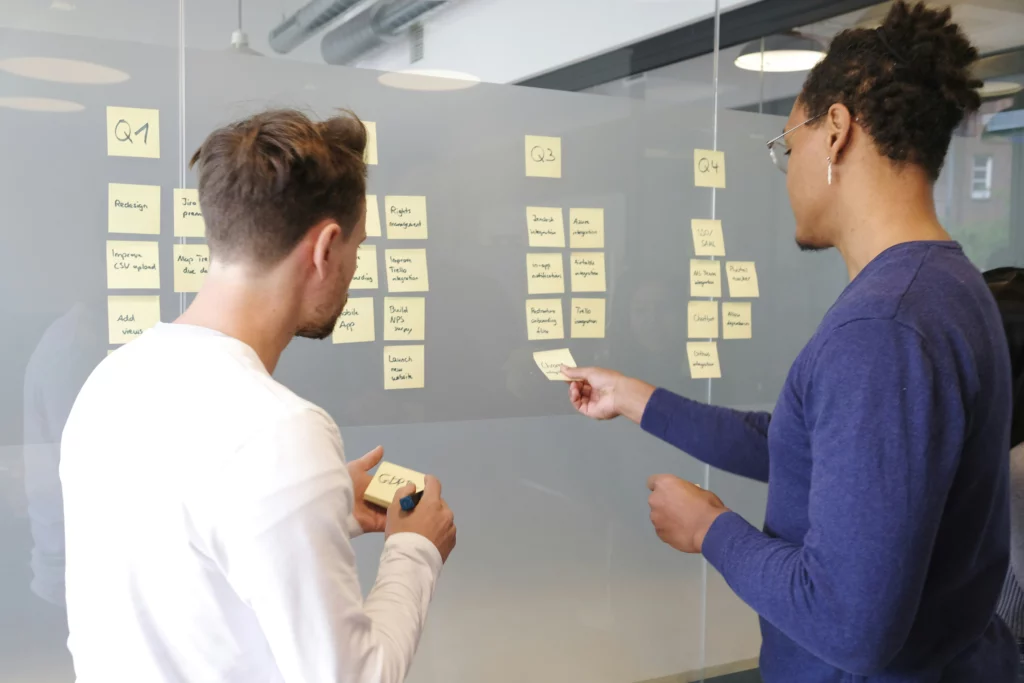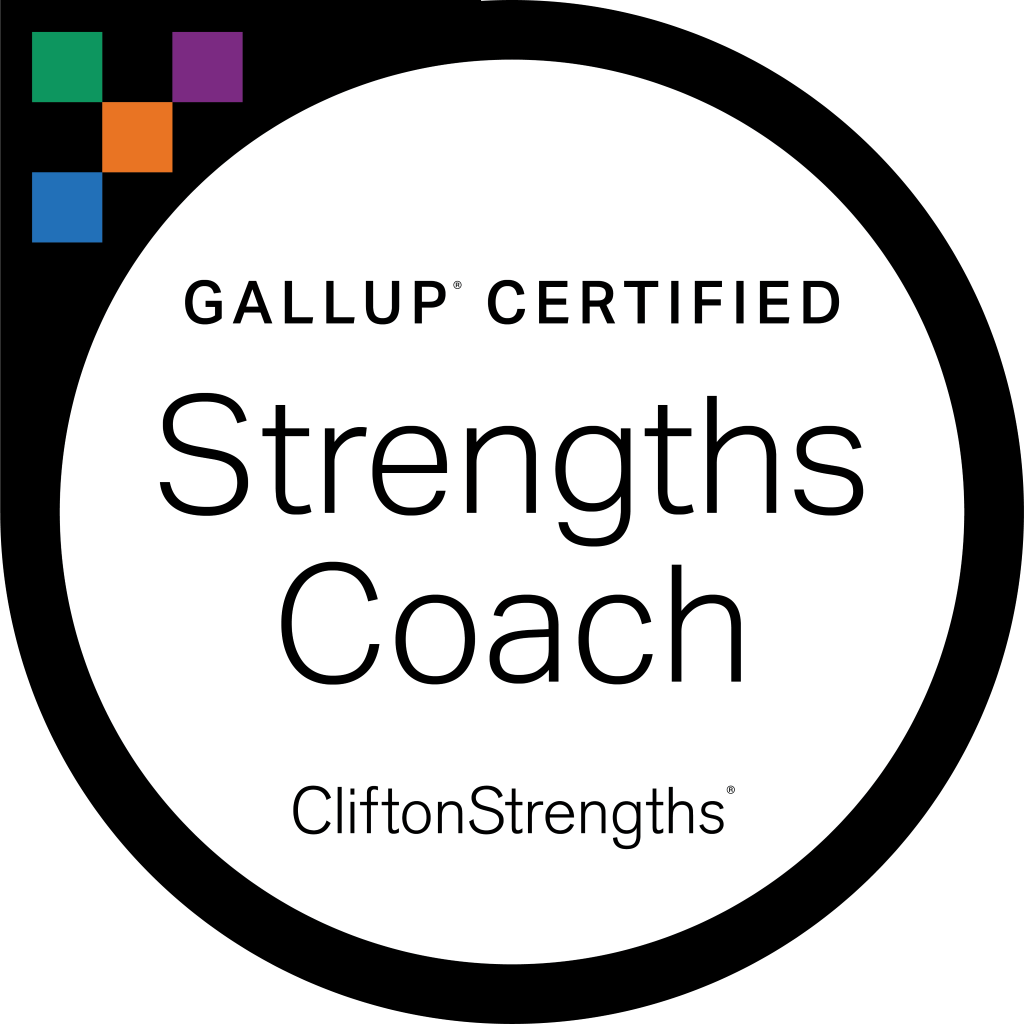What are Gallup talents and how can you use them in practice? – discover your 34 Gallup talents.
How to work smarter, not harder? What makes some tasks come easily to us, while others require enormous effort? The answer may lie in Gallup’s talents – a concept that helps us discover our natural predispositions and build effective actions on them, instead of fighting what does not serve us.
In this article, I will explain what Gallup’s talents are and why learning about them can be a turning point in your professional and personal life. It is a tool that allows you to look at yourself from a new perspective and use your potential to the fullest.
Table of Contents
What are Gallup talents?
The Gallup Institute defines talent as a recurring pattern of thinking, feeling, and acting that can be used productively. It is an innate tendency that each of us manifests in our own unique way.
Based on many years of research, Donald Clifton, the creator of this approach and a pioneer of positive psychology, identified 34 universal talents, or areas of natural predisposition. Each person has their own individual combination of these traits, with five of them being the most dominant – the so-called Top 5.
These talents are not something that needs to be acquired – we already have them. The key is to recognize and develop them, transforming them into real strengths through conscious action, practice, and the right environment. Gallup’s simple model says: talent + investment = strength.
Getting to know your talents is a step towards a deeper understanding of yourself – what gives you energy, how you make decisions, build relationships, and learn new things. This makes it easier to make the right career choices, collaborate more effectively with others, and act in harmony with your own nature, rather than against it.

Four domains and 34 Gallup talents
The Gallup Institute distinguishes 34 talents grouped into four main domains: Executing, Influencing, Relationship Building, and Strategic Thinking. Below, I present the individual Gallup talents from each domain along with a brief description of each. Remember that all talents are neutral—there are no “better” or “worse” talents. Each of them, when used properly, can become our strength, and when neglected, our weakness.
Executing
Talents in this domain help turn plans into action and effectively achieve goals. People with executing talents like to work hard, take responsibility, and see things through to the end.
- Achiever – people with this talent feel a strong need to achieve goals and be productive every day. They derive satisfaction from achieving results, completing tasks, and measuring progress. They like to work intensively and set themselves ambitious challenges.
- Arranger – People with this talent are not only able to plan and organize tasks, but also have the flexibility to complement their organizational skills – they like to consider how to use all elements and resources to achieve maximum efficiency.
- Responsibility – people with this talent feel an inner obligation to keep their word. They have a strong sense of duty and are guided by values such as honesty and loyalty.
- Discipline – people with this talent like routine and established structures. They function best when their environment is organized and orderly.
- Restorative – people with this talent are good at solving problems. They can find what is not working and quickly figure out how to fix it.
- Focus – people with this talent are able to set specific goals for themselves and persistently follow the chosen path. Thanks to their strong concentration, they are not easily distracted and, if necessary, they correct their course to stick to the plan.
- Belief – people with this talent are guided by certain fundamental principles that are immutable for them. These values are their internal compass – they give meaning to their actions and decisions.
- Deliberative – people with this talent think deeply before making a decision or choice. They are cautious and prudent – they can anticipate potential obstacles by analyzing the risks before taking action.
- Consistency – people with this talent are sensitive to the need to treat everyone equally. They try to treat everyone objectively, setting clear rules and sticking to them consistently.

Influencing
Talents that support influencing, inspiring, and leading others. People with talents in the domain of Influencing are able to convince others of their ideas, motivate a team, and effectively represent others.
- Woo – people with this talent love the challenge of meeting new people and winning their approval. They derive satisfaction from breaking the ice and building relationships with others.
- Command – People with this talent are charismatic and able to exert a strong influence on others. They take control in difficult situations and make decisive decisions, giving the group a sense of direction.
- Maximizer – people with this talent focus on what works best. They like to streamline and improve – they strive to achieve maximum performance both in themselves and in others (they turn something good into something perfect).
- Communication – people with this talent easily “put their thoughts into words.” They are good conversationalists and speakers – they can tell stories vividly and capture their listeners’ attention.
- Significance – people with this talent want others to treat them with great respect. They strive to leave a lasting mark – they want to feel important, independent, and appreciated by those around them.
- Self-Assurance – people with this talent are convinced that they have the ability to control their own lives. They have a strong inner conviction about the rightness of their decisions and intuition, which allows them to take on even difficult challenges with confidence.
- Activator – people with this talent do not like to procrastinate – they are able to quickly move from idea to action. They initiate change, energize others, and infect them with their enthusiasm, although they can be impatient when waiting for results.
- Competition – people with this talent measure their success by comparing it to the results of other people. They love competition – they always try to be the best and strive for victory in everything they do.

Relationship Building
Talents that facilitate cooperation and create a cohesive, supportive team. People with talents in this domain care about a good atmosphere, trust, and close relationships with others—they are able to bring the group together and build strong bonds.
- Adaptability – people with this talent prefer to “go with the flow.” They tend to be “people of today” who take things as they come and discover the future day by day.
- Empathy – people with this talent are able to read other people’s feelings by imagining themselves in their place. This makes it easy for them to empathize with another person’s perspective – they are distinguished by their empathy, which builds an atmosphere of understanding within the group.
- Individualization – people with this talent are intrigued by the uniqueness of each individual. They have a gift for understanding how different people can work together effectively despite their differences.
- Connectedness – people with this talent deeply believe in the interconnectedness of all things. They are convinced that there are very few coincidences – almost every event has a cause and meaning.
- Includer – people with this talent are open and accepting of others. They notice people who are excluded and make an effort to include them in the group, building a sense of belonging.
- Relator – people with this talent enjoy close relationships with others. They love working with friends toward a common goal and value an atmosphere of trust and loyalty at work.
- Developer – people with this talent see potential in people and want to support it. They rejoice in every bit of progress in others, no matter how small – this is a distinctive feature of development, which gives them great satisfaction in helping others grow.
- Positivity – people with this talent exude positive energy and enthusiasm. Their cheerful attitude rubs off on others – they can inspire hope in a team and make working together a pleasure.
- Harmony – people with this talent strive for agreement and avoid conflict. They seek common ground – they prefer to bring people together rather than divide them, thus creating a harmonious and peaceful work environment.

Strategic Thinking
Talents in this domain support analyzing information, predicting the future, and creating strategies. People with these talents often think deeply before making decisions and have a strong desire to learn. Their strength lies in recognizing meaningful patterns, planning, and transforming ideas into action.
- Strategist – people with this talent can quickly assess a situation and come up with alternative courses of action when faced with any situation. Their strength lies in their ability to quickly spot important and meaningful patterns and choose the best course of action.
- Futuristic – people with this talent create compelling visions of the future. They are ahead of their time – they discover the future day by day, but always with a sense of purpose and direction.
- Learner – people with this talent have a strong desire to learn and develop. They enjoy the process of acquiring knowledge – they learn not to obtain a certificate, but because they are truly passionate about it.
- Analytical – analysts are characterized by logic, precision, and a need to understand. They can break down a problem into its constituent parts and question every conclusion until they find hard data.
- Intellection – people with this talent value time for reflection and deep thinking. They like to discuss complex issues and ponder the meaning and causes of things.
- Input – people with this talent have a gift for understanding and gathering information. They like to collect knowledge, objects, and ideas, believing that they may be useful someday.
- Ideation – People with this talent are fascinated by new ideas. They love to combine seemingly unrelated concepts and create innovative solutions.
- Context – People with this talent analyze the past to understand the present. They value historical facts and learn from the experiences of others.

(The above descriptions of individual Gallup talents are based on official definitions CliftonStrengths®)
How to develop Gallup talents?
Knowing your results is just the beginning—talents and strengths require conscious effort to fully shine. How can you develop your Gallup talents in practice?
- Take the Gallup test and discover your talents.
Start by obtaining objective information about your Top 5 talents (or a full profile of 34 talents).
- Observe how a given talent manifests itself on a daily basis.
Think about which tasks or situations make you feel like you’re in a “flow” state—that’s probably when you’re using your natural talent. Being aware of when and where you use a particular talent will help you use it more consciously.
- Practice your talent consciously.
Plan activities that allow you to use and strengthen your talent in action. For example, if you have the talent of Communication, you can speak in public more often or write articles, and if you have the talent of Empathy, you can engage in active listening to others. Regular practice
- Combine your talents with learning new skills.
Every talent gives you a solid foundation – it is worth supplementing it with new knowledge and experience. If you have the Analyst talent, develop your data analysis or planning skills. If your talent is Developing Others, you can take a coaching or mentoring course.
- Work with a coach or mentor.

A certified Gallup Institute coach will help you interpret your Gallup test results and prepare a personalized development plan. Such a mentor will show you practical strategies for working with Gallup talents and advise you on how to develop your talents in line with your goals. The support of an experienced coach will help you understand how your dominant talents influence different areas of your life and how to turn them into real successes.
How to use Gallup’s talents in practice?
At work: Tailor your responsibilities to your natural aptitudes and strengths to work with greater commitment and efficiency. By leveraging the talents of employees, the team becomes more effective—everyone works in their zone of talent, doing what they do best. A leader who knows the dominant talents of their team can more effectively distribute tasks and create complementary partnerships between people.


In your personal life: Awareness of your own talents translates into greater self-confidence and a sense of purpose. You understand your reactions and needs better, which has a positive impact on your relationships—it becomes easier to accept differences and appreciate the talents of others. In moments of stress or overload, you can draw on your strongest talents to regain balance (e.g., a person with the Strategist talent will find an alternative solution to a problem, while someone with the Optimist talent will focus on the positives). This makes it easier for you to prevent burnout and deal with challenges more effectively.
Where and how to take the Gallup test? Discover your top 5 talents
Are you wondering where you can take the Gallup test and what the process looks like? Below you will find all the necessary information – from the course of the test, through the interpretation of the results, to the most common pitfalls.
How does the Gallup test work?
The Gallup Institute’s talent test – CliftonStrengths® (commonly referred to as the Gallup test) – is an online survey. It can only be taken on the official Gallup website (access to the test is subject to a fee).
There are two options to choose from: the CliftonStrengths 5 version (the result presents only the 5 dominant talents) and the full CliftonStrengths 34 version (we obtain the order of all 34 talents along with a description of each of them).
The Gallup test consists of 177 questions (these are pairs of statements that must be evaluated within a limited time). Only 20 seconds are allowed for each question, so it is more convenient to complete the Gallup test in your native language.
What happens after the test?
Once you have completed the test, the results will be immediately available in your Gallup Access account. The standard CliftonStrengths report presents the names of the talents in English, but don’t worry – you can download an additional description of each of the 34 talents in Polish from the Gallup website.
It is worth taking the Gallup test in cooperation with a certified CliftonStrengths coach, because in addition to the results themselves, you will receive a professional discussion.
Beware of free Gallup tests
Free Gallup talent tests available on the internet are not the same as the original CliftonStrengths assessment. They can be an interesting inspiration, but they are not the same as Donald Clifton’s scientific tool developed by the Gallup Institute.
Only the original Gallup talent test guarantees reliability and access to full development reports.
Summary
Discovering and developing your Gallup talents is an investment in yourself that can help you spread your wings in many areas of life. Gallup’s approach allows you to focus on developing your strengths rather than filling in the gaps. Awareness of your own talents, in turn, enables you to consciously manage your life and career in line with your predispositions (this is nothing more than taking the helm and steering your own life based on what comes naturally to you).
This philosophy is gaining popularity around the world – the Gallup Institute is already helping millions of people discover their strengths and put them into practice. Development based on Gallup’s talents brings greater job satisfaction, better team performance, and a more authentic, strength-based life.
The first step? Take the Gallup talent test and discover your Top 5. Then start consciously working with what is best in you – develop and use your talents every day. You have enormous potential, so it is worth awakening it and turning it into real strengths. This is the essence of Gallup’s idea: to help us all be the best version of ourselves through what is naturally strong in us – our natural talents.
